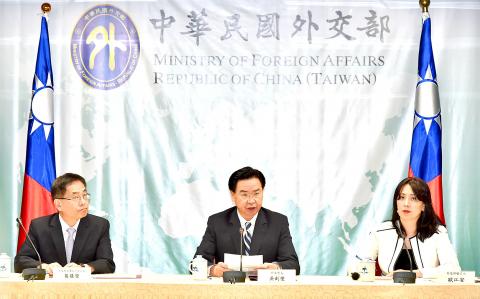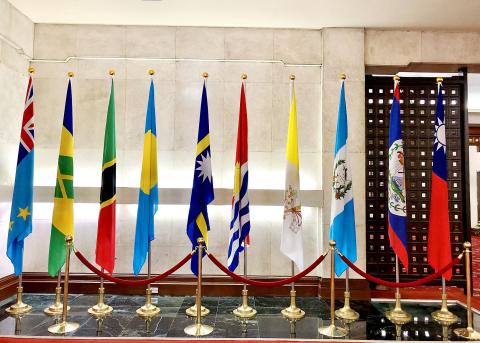Taiwan yesterday lost a second diplomatic ally in a week after Kiribati decided to switch recognition to China.
Taiwan “regrets and strongly condemns” Kiribati for disregarding the years of assistance and friendship that Taipei had extended to Tarawa, Minister of Foreign Affairs Joseph Wu (吳釗燮) told a news conference at 1pm yesterday, adding that the Ministry of Foreign Affairs received a formal notice of the termination of relations from Kiribati at about 11am.
The government “hereby declares that it is terminating diplomatic relations with the Republic of Kiribati effective immediately, ending all bilateral cooperative projects and recalling the staff of its embassy, technical mission and medical mission stationed in Kiribati,” Wu said.

Photo: Tu Chien-jung, Taipei Times
The Solomon Islands cut ties with Taipei on Monday, making Kiribati the seventh to switch allegiance to Beijing since 2016, following Sao Tome and Principe, Panama, the Dominican Republic, Burkina Faso, and El Salvador.
Taiwan now has only 15 diplomatic partners, including four in the Pacific.
Kiribati had demanded that Taiwan help it acquire airplanes for “commercial purposes,” which is not consistent with the spirit of the International Cooperation and Development Act (國際合作發展法), which aims to develop public infrastructure, Wu said.

Photo: CNA
Taipei’s proposed program to obtain the aircraft under a commercial loan was rejected, while Beijing promised to offer Tarawa several civilian aircraft and commercial ferries, he said.
Since taking office in 2016, Kiribatian President Taneti Mamau and some members of his ruling Tobwaan Kiribati Party have engaged in frequent exchanges with China, Wu said, adding that Beijing has used fisheries and other commercial investments to extend its presence in the Pacific country.
Beijing’s campaign to push Taiwan’s allies to sever formal relations aims to suppress the nation’s international presence and force Taiwanese to accept China’s “one country, two systems” framework, he said.
Asked if the government has a strategy to “stop the bleeding,” Wu said that the ministry has required overseas officials to maintain close communications with local officials at each allied nation.
Despite some “minor signs” of crisis in the four remaining Pacific allies — Palau, Nauru, Tuvalu and the Marshall Islands — their ties with Taiwan “are nothing to worry about,” he said.
The government has not yet discussed whether to adjust overall foreign policy, Wu said, adding that informal relations with other countries are also crucial for Taiwan.
Presidential Office spokesman Ting Yun-kung (丁允恭) later yesterday confirmed that Wu had asked President Tsai Ing-wen (蔡英文) to take disciplinary action, but added that Tsai has asked Wu to stay in his position, as China’s actions are clearly to blame for Taiwan’s diplomatic setbacks.
“China has chosen this time to strike a series of blows against Taiwan, because only slightly more than 100 days remain until the presidential election,” Tsai said, adding that Taiwan would never accept the “one country, two systems” formula.
Kiribati has made a big mistake by leaving as sincere a friend as Taiwan to become China’s pawn, she added.
Separately yesterday, the American Institute in Taiwan (AIT) expressed disappointment over Kiribati’s decision to abandon its ties with Taipei, saying that Taiwan is a democratic success story, a reliable partner and a force for good in the world.
“We continue to express concerns with China’s campaign to pressure countries to discontinue ties with Taiwan. We continue to have an interest in cross-strait peace and stability,” the AIT said in a statement.
Additional reporting by agencies

Intelligence agents have recorded 510,000 instances of “controversial information” being spread online by the Chinese Communist Party (CCP) so far this year, the National Security Bureau (NSB) said in a report yesterday, as it warned of artificial intelligence (AI) being employed to generate destabilizing misinformation. The bureau submitted a written report to the Legislative Yuan in preparation for National Security Bureau Director-General Tsai Ming-yen’s (蔡明彥) appearance before the Foreign Affairs and National Defense Committee today. The CCP has been using cognitive warfare to divide Taiwanese society by commenting on controversial issues such as Taiwan Semiconductor Manufacturing Co’s (TSMC, 台積電) investments in the

INVESTIGATION: The case is the latest instance of a DPP figure being implicated in an espionage network accused of allegedly leaking information to Chinese intelligence Democratic Progressive Party (DPP) member Ho Jen-chieh (何仁傑) was detained and held incommunicado yesterday on suspicion of spying for China during his tenure as assistant to then-minister of foreign affairs Joseph Wu (吳釗燮). The Taipei District Prosecutors’ Office said Ho was implicated during its investigation into alleged spying activities by former Presidential Office consultant Wu Shang-yu (吳尚雨). Prosecutors said there is reason to believe Ho breached the National Security Act (國家安全法) by leaking classified Ministry of Foreign Affairs information to Chinese intelligence. Following interrogation, prosecutors petitioned the Taipei District Court to detain Ho, citing concerns over potential collusion or tampering of evidence. The

‘COMPREHENSIVE PLAN’: Lin Chia-lung said that the government was ready to talk about a variety of issues, including investment in and purchases from the US The National Stabilization Fund (NSF) yesterday announced that it would step in to staunch stock market losses for the ninth time in the nation’s history. An NSF board meeting, originally scheduled for Monday next week, was moved to yesterday after stocks plummeted in the wake of US President Donald Trump’s announcement of 32 percent tariffs on Taiwan on Wednesday last week. Board members voted to support the stock market with the NT$500 billion (US$15.15 billion) fund, with injections of funds to begin as soon as today. The NSF in 2000 injected NT$120 billion to stabilize stocks, the most ever. The lowest amount it

NEGOTIATIONS: Taiwan has good relations with Washington and the outlook for the negotiations looks promising, Minister of Economic Affairs J.W. Kuo said Taiwan’s GDP growth this year is expected to decrease by 0.43 to 1.61 percentage points due to the effects of US tariffs, National Development Council (NDC) Minister Paul Liu (劉鏡清) said at a meeting of the legislature’s Economics Committee in Taipei yesterday, citing a preliminary estimate by a private research institution. Taiwan’s economy would be significantly affected by the 32 percent “reciprocal” tariffs slapped by the US, which took effect yesterday, Liu said, adding that GDP growth could fall below 3 percent and potentially even dip below 2 percent to 1.53 percent this year. The council has commissioned another institution